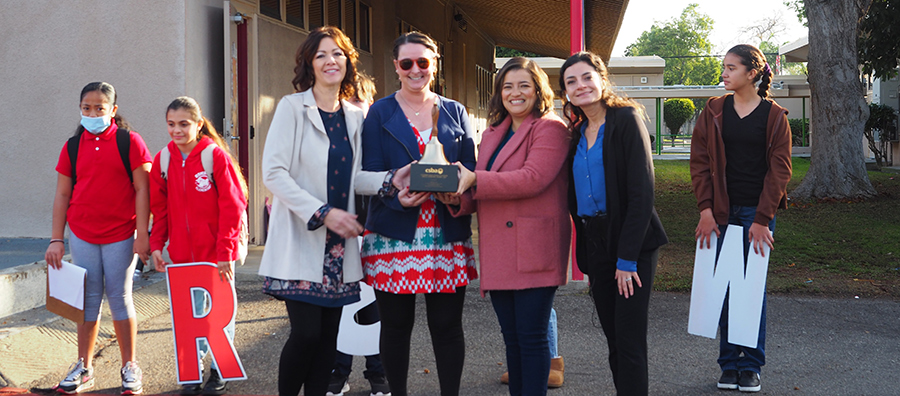class act Best practices in action
Best practices in action

class act
Best practices in action


Each year, children in Ramona Elementary School get a taste of what it takes to develop and implement a policy that will benefit their peers and campus community. In doing so, district leaders say students begin to develop critical-reasoning skills, empathy for others and more as they rise to the occasion.
“We need to start as early as possible to listen to the community and listen to the children,” said Bellflower Unified School District Board President Renita Armstrong. “Let’s not limit the kids, let’s put it out there, give them that challenge.”
Established in 2019, the 2022 Golden Bell Award-winning civics education program seeks to prepare and engage students to be civically active and responsible members of society. Children are provided an opportunity to engage in a yearlong civic inquiry based on a compelling question that is investigated, researched and debated, culminating in a policy proposal to bring about positive change in the school or community.
While civics education includes fundamental knowledge of how the U.S. government functions, key processes like voting and more, lessons also provide students an opportunity to hone their critical-thinking skills and learn to better evaluate information. Students who experience high-quality civics education are more likely to complete college and develop skills sought by employers across sectors, such as communication and public speaking, according to researched cited by iCivics — a nonprofit civic education advocacy group that provides free resources to schools. They are also more likely to vote when they’re older, discuss policy issues at home and volunteer in their communities.
All Ramona Elementary fifth and sixth graders participate in the civic engagement program. The students engage in identifying a need based on data and their own educational experience and develop a compelling question to investigate, centered on that need.
Once they have their compelling question, students investigate the topics by engaging in research, debates, town hall meetings, presentations, Socratic seminars and more. A Socratic seminar is a formal discussion in which a teacher asks open-ended questions to spark conversation, during which students listen closely to the comments of others and thinking critically for themselves before articulating their own thoughts in responding to the thoughts of others.
“Based on these practices, the students then suggest or help enact a policy change. For example, the students participated in the California Healthy Kids Survey and Panorama Social Emotional Survey, and they identified the need to improve and promote civility of the student body,” Armstrong said of a recent cohort. “Many felt the lack of belonging and friendliness toward one another, and bullying and poor behavior was especially prevalent during recess hours. So, the teachers spent a great deal of time building skills for civil dialogue, which enables students to thoughtfully and effectively engage in these Socratic seminars, and revealed a number of personal and profound issues for the students.”
Through the program, students develop a school policy that is presented to the school principal. In this case, they created a buddy mentor program between the older and younger students. Children would pair up and sometimes develop structured recesses where they would assign activities to avoid reoccurring conflicts on the playground, Armstrong said. Comment boxes were also put in each classroom to gather additional input.
“All of this is driven by the kids. Instead of us teaching them, we switch the method of inquiry to where they set the pace, they developed everything, they saw the need, collected the data and proposed the solutions. We actually just empowered these kids on their level,” Armstrong said. “A lot of times we underestimate what our children can do and what our children can teach adults. Schools have policies that require decision making based on needs, and who better than students to be the ones to help and come up with that policy and bring about that positive change? Of course, this is being guided through the adults, but it’s funny how if you put the expectation on those kids, you’d be surprised what they can do.”
While the other schools in the district are not participating yet, Armstrong said they all have some unique element to civic learning, as it is in the district mission. “Bellflower’s mission is to build futures for our students by providing a pathway for all students to be responsible and informed because we need them to be productive citizens who can compete in the diverse world,” she continued.
“In order for students to excel, it is important that they learn these skills necessary to engage critically within the community and understand their role as being a contributor to society. It is important that the students learn how the government works and understand democratic process, and their role,” Armstrong said. “We want to see [the Ramona civics education program] grow and expand to all of our schools. We all have something going on with behavior interventions and that kind of stuff, but to have the students lead it is powerful. We still have a lot of growing to do and we are ready for it.”
— Alisha Kirby